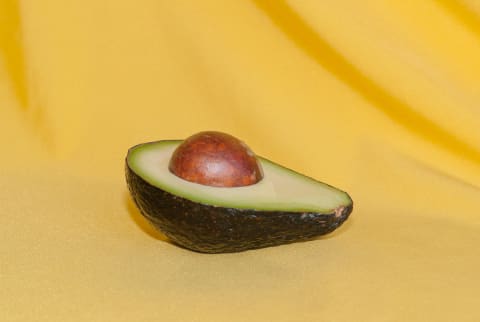Advertisement
This ad is displayed using third party content and we do not control its accessibility features.

Beauty & Health Editor
Beauty & Health Editor
Hannah Frye is the Beauty & Health Editor at mindbodygreen. She has a B.S. in journalism and a minor in women’s, gender, and queer studies from California Polytechnic State University, San Luis Obispo. Hannah has written across lifestyle sections including beauty, women’s health, mental health, sustainability, social media trends, and more. She previously worked for Almost 30, a top-rated health and wellness podcast. In her current role, Hannah reports on the latest beauty trends and innovations, women’s health research, brain health news, and plenty more.

Image by Dose Juice / Unsplash
August 27, 2024
“An apple a day keeps the doctor away,” as the saying goes, is up for some competition. According to research, another fruit (that’s often mistaken for a vegetable) has been shown to improve overall diet quality.
An avocado a day improves overall diet quality
The sample included 1,008 participants (72% female) with an average age of 50. The participants also had a low avocado intake before the study, consuming two or fewer avocados each month.
The group was split in half for the experiment—one group limited their avocado intake and the other committed to eating one avocado each day. To measure overall diet quality, researchers evaluated how closely the participants followed the Dietary Guidelines for Americans, which included prioritizing nutrient-dense foods and beverages, staying within caloric limits, limiting foods and beverages higher in added sugars, saturated fat, and sodium, and limiting alcoholic beverages.
When analyzing how the avocado group’s diet improved, researchers note a greater intake of vegetables and more favorable fatty acid intake—meaning they consumed more unsaturated fats than saturated fats.
The avocado group also experienced positive changes in their consumption of sodium, refined grains, and added sugars. However, the avocado group also showed some displacement of total protein (seafood and plant protein) with the avocado intervention.
The message here is really not that you have to eat an avocado a day, nor that it’s right for everyone. Rather, incorporating more whole foods into your diet (avocados and otherwise) is one way to encourage a healthier plate without obsessing over restriction.
In fact, while avocados are filled with healthy fats, vitamins, and minerals, consuming a wide array of plants is important—especially for gut health. Hence, why some health experts recommend trying to eat 30 or more different plants each week (yes, spices and herbs count) in pursuit of a thriving, diverse gut microbiome.
5 ways to get more avocado in your diet
From omega-3s to vitamins C, E, and K, avocados pack a nutrient punch. As demonstrated in the study, adding more of them to your diet can be one way to replace some other fats without compromising flavor.
Plus, there’s a plethora of ways to use them. Below, some inspiration to take right to your kitchen.
- Add avocado to your smoothie for a creamy texture
- Blend it with herbs, spices, and olive oil to make a rich dressing
- Top your scrambled eggs or omelet with a few slices
- Dice it up and add it to a chopped salsa
- Stuff it with diced cucumber, feta, and tomato for a quick snack
The takeaway
A study published in the Current Developments in Nutrition found that eating one avocado a day increased participants’ adherence to a healthy diet, as the Dietary Guidelines for Americans define it.
